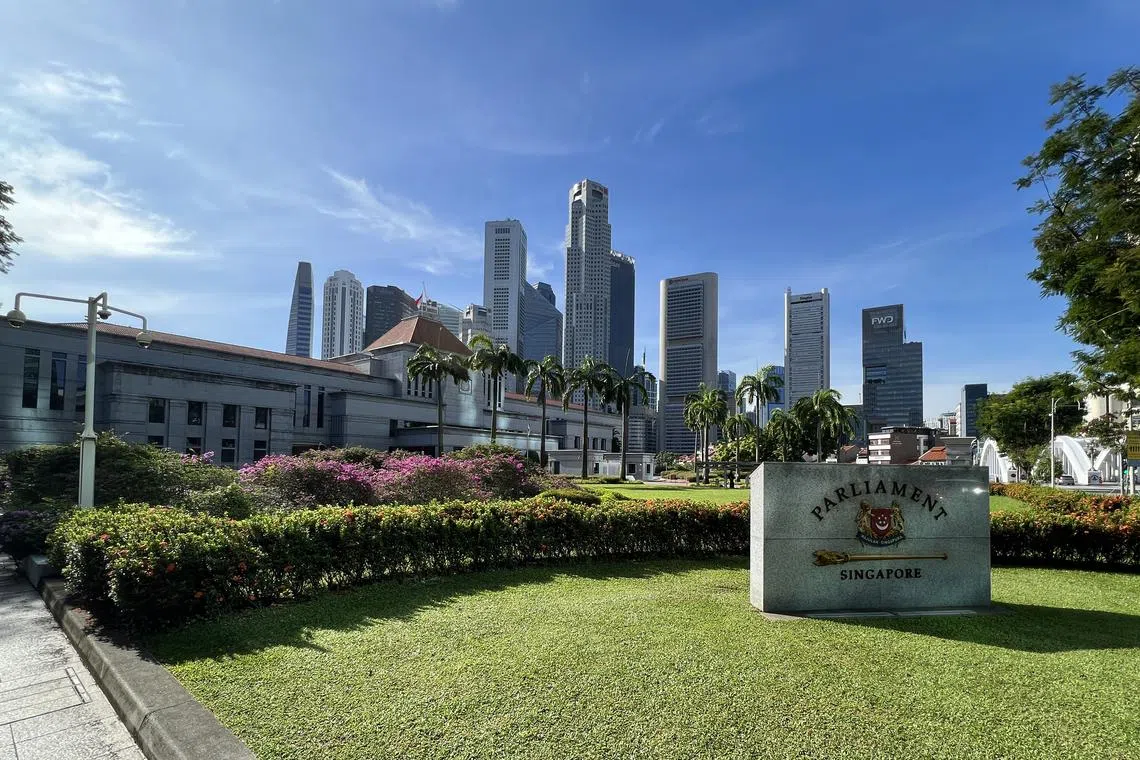From protecting marriage to reserved presidency: What is the Constitution and why does it matter?
Sign up now: Get ST's newsletters delivered to your inbox

The Constitution of the Republic of Singapore (Amendment No. 3) Bill was introduced in Parliament on Nov 6. The change will be put to a vote.
ST PHOTO: ALPHONSUS CHERN
Follow topic:
SINGAPORE – The president of Singapore and Cabinet ministers will soon be able to take up appointments in foreign organisations
The change, tabled in a Bill in the House on Monday, will be put to a vote. If passed, it will become the 10th amendment to the Constitution in the last six years. That is more than three times the number of changes made in the six years before.
Key changes in recent years include the creation of the reserved presidency in 2017,
Former president Halimah Yacob stood for the polls in September 2017, and won uncontested.
In 2022, another constitutional amendment was made to protect the heterosexual definition of marriage from legal challenge.
But what exactly is the Constitution, and what purpose does it serve? When someone says it is the highest law of the land, what do they mean?
The Straits Times speaks to constitutional law experts to find out more.
1. What is the Constitution?
It is a set of rules for running a country. It sets out how a state is to be organised into different branches of government, and the fundamental rights of citizens that the Government must not violate, said constitutional law expert Kevin Tan, who is an adjunct professor at the law faculty in the National University of Singapore (NUS).
Nearly every country in the world has a Constitution.
The Singapore Constitution was “cobbled together” from a mix of Malaysian legal texts and Singapore’s newly drafted Independence Act in 1965, when Singapore gained independence, said Prof Tan.
In 1980, the Constitution was merged into a single document that is still in use today.
As founding documents, Constitutions may be revered in some societies, Prof Tan added. For instance, the United States Declaration of Independence is viewed by many Americans as sacred.
2. What can be found in the Singapore Constitution?
There are 166 provisions in the Constitution, and key sections set out the structure of the Government and the fundamental liberties or rights guaranteed to citizens, said Mr Suang Wijaya, a constitutional lawyer and partner at Singapore law firm Eugene Thuraisingam.
The Constitution stipulates three branches of government: the legislature, made up of Parliament and the president; the executive, meaning Cabinet ministers; and the judiciary.
It sets out what powers each branch has, and how those powers should be exercised.
It also protects the basic rights of citizens, like the right to equal protection under the law, freedom of speech and freedom of religion. Equal protection means everyone should get fair treatment under the law.
3. Why have a Constitution?
Historically, Constitutions stem from a distrust of absolute power. An important aim of a Constitution is “limited government”, meaning it both grants and limits state power, said Associate Professor Jaclyn Neo, who teaches constitutional law at NUS.
It provides an orderly foundation to a state while also imposing legal constraints on the government, she added.
One key feature is the constitutional guarantee of fundamental liberties, said Prof Neo. These rights tend to be qualified, which means they may not apply when certain exceptions arise.
However, enshrining them in the Constitution means they should not be withheld lightly, regardless of the government of the day.
For instance, freedom of speech is a citizen’s right, unless that freedom jeopardises national security. When that happens, a citizen loses the right to be protected under the Constitution for speaking about an issue.
Constitutions thus represent how in a society, people accept that a “balance needs to be struck between guaranteeing the greatest liberty to the individual, and ensuring that the state has enough power to govern effectively”, said Prof Tan.
They are, therefore, the ultimate political bargain that the people make with their government, he added.
British politician and historian Lord Acton, writing in the 19th century, captured the spirit of constitutionalism when he said: “Power tends to corrupt and absolute power corrupts absolutely.”
4. Why is the Constitution called the highest law of the land?
Laws, too, have a hierarchy, with the Constitution at the top. This means any law or government action that goes against the Constitution is unlawful, said Mr Wijaya.
In practice, citizens must go to court and mount a constitutional challenge to strike down a law if they feel that it breaks with the Constitution. So far, no constitutional challenge in Singapore has been successful.
Before Parliament voted in November 2022 to repeal Section 377A, a law criminalising gay sex in Singapore, there had been a string of constitutional challenges since 2010. In 2022, Mr Wijaya represented a client during the last court challenge to the colonial-era law before it was repealed by Parliament.
In his National Day Rally speech in August 2022, Prime Minister Lee Hsien Loong said there was “significant risk” of the law being struck down by the courts for breaching the Constitution.
It may appear illogical to declare a law “unlawful”. However, this is one way to make sure laws are legitimate only when they align with a country’s key values.
This idea is central to a major constitutional principle known as the “rule of law”, which means the Government is bound by the law, especially the highest law, the same way citizens are, said Mr Wijaya.
If the Government is able to ignore court rulings or replace members of the judiciary, then there would be no rule of law and the Government would have “absolute power”, he added.
5. How is the Constitution protected?
It is sometimes said that a Constitution that does not bend, will break, said Prof Neo.
A Constitution must be amendable to meet new realities, but having one as a higher law means it can be changed only when a higher threshold of support has been met, she added.
This is because the text of the Constitution governs what is lawful – anything contained in it becomes extremely difficult to challenge.
Like Singapore, many countries require two-thirds of Parliament to pass a constitutional amendment. This is known as a super-majority, which the ruling People’s Action Party has had since 1963.
Ordinary laws require only a simple majority of more than half the votes in Parliament to be passed.
“Given this political reality, it is really quite easy to amend most parts of our Constitution,” said Prof Tan.
However, the Government may resist amending the Constitution even though it can, because it can upset or anger large sections of the electorate, he added.
“In this sense, the plebiscite acts as an informal check,” he said. A plebiscite refers to the popular vote.
6. What are some of the major changes that have been made to the Constitution?
Landmark changes in Singapore include the introduction of the Non-Constituency Member of Parliament scheme in 1984, the group representation constituency scheme in 1988 and the Nominated MP scheme in 1990.
In 1991, the Constitution was amended to change the presidency from a nominated office to an elected one, and in 2017, the reserved presidency was created.
7. What are the limits of the Constitution?
For all the romance and idealism that come with a country’s founding law, it is still a document that can be interpreted and influenced by the local context, said Prof Neo.
This means Constitutions with similar provisions can look very different in practice, she added.
“Singapore has over time developed a more communitarian approach to its Constitution. This means that there is greater emphasis on public goods and social cohesion over strident individual rights,” she said.
A judge can also interpret the Constitution, said Mr Wijaya, because it is often drafted in broad terms and general principles. So, different judges can reach different conclusions on whether the Constitution has been breached in each case, he added.
Mr Wijaya said: “Much will depend on the commitment of each nation’s leaders to the rule of law and constitutionalism. A Constitution may not work if the institutions do not uphold a basic commitment to the rule of law.”
Correction note: An earlier version of this story stated that People’s Action Party has had a super-majority since 1959. This is incorrect. PAP has had a super-majority since 1963. We are sorry for the error.


